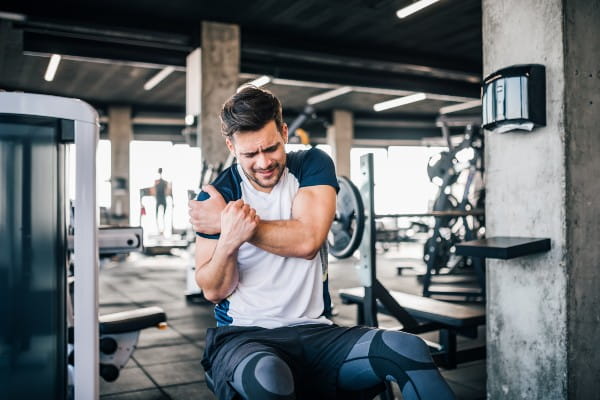The ball-and-socket joint allows your shoulder to move in a wide range of directions and motions. An injury or repetitive use can cause the “ball” to loosen up or fall out of the socket. That’s when chronic shoulder instability can become a problem.
“Sports that cause collisions like football and downhill skiing, and those that involve repeated, overhead motion like tennis, baseball, volleyball and swimming can put someone at risk for shoulder instability,” says Riverside Orthopedic Surgeon Scott R. Kling, M.D.
In some cases, a shoulder dislocates – comes out of the socket partially or fully – after a traumatic injury.
“Those who experience a dislocated shoulder become more vulnerable to shoulder instability because of micro-tears and soft tissue damage,” Dr. Kling says.
Falls can also cause shoulder instability as can shoulder movement required to perform some types of jobs.
How does a doctor diagnose shoulder instability?
Signs of shoulder instability include:
- Clicking sounds in the shoulder
- Feeling like the shoulder is loose or coming out of place
- Numbness or tingling down the arm
- Repeated dislocation
- Shoulder pain
An orthopedic specialist will conduct a physical exam to diagnose shoulder instability. X-rays to look at bones and MRIs to look at soft tissue will also be helpful tools to diagnose the problem.
Treatment options for shoulder instability
Nonsurgical solutions
Depending on how severe your condition is, your orthopedic specialist may first recommend nonsurgical shoulder treatment. These options include:
- Activity modification – Make lifestyle changes or avoid activities that aggravate symptoms
- New techniques – Learn better form for overarm motion in sports, such as baseball pitching.
- Nonsteroidal anti-inflammatory medication – Take aspirin or ibuprofen to reduce pain and swelling.
- Physical therapy – Strengthen shoulder muscles with exercises designed by a physical therapist or athletic trainer to prevent shoulder instability or improve it.
Surgical solutions
For some, shoulder treatment will require orthopedic surgery to repair torn or stretched ligaments that hold the shoulder in place.
An arthroscope allows a surgeon to see inside the joint with a miniature video camera inserted through an incision as small as a quarter of an inch. This allows for a minimally invasive repair.
Some people may require open surgery for a better view of the area. After surgery, you’ll wear a sling and see a physical therapist for exercises to regain range of motion and strength.
Riverside Orthopedics and Sports Medicine Specialists can help with shoulder instability concerns or symptoms. Our specialists offer options for treating a variety of conditions – from nagging joint pain to sports injuries – all with a focus on returning to life and play.



